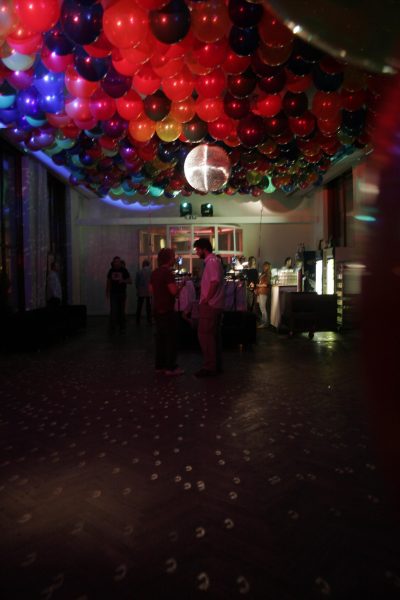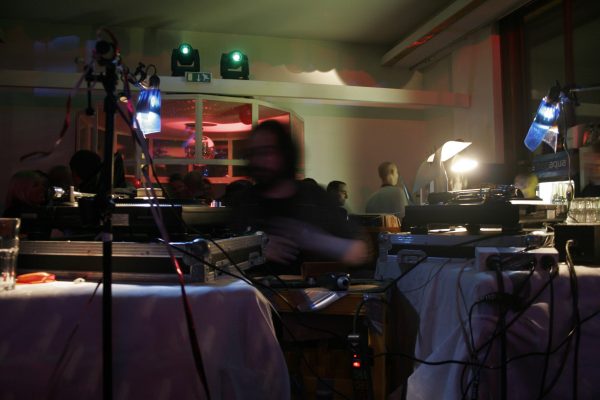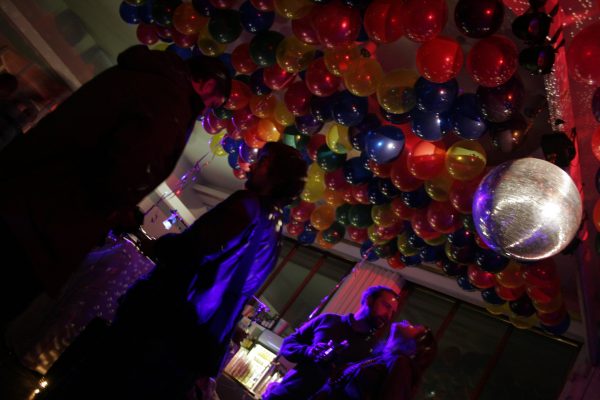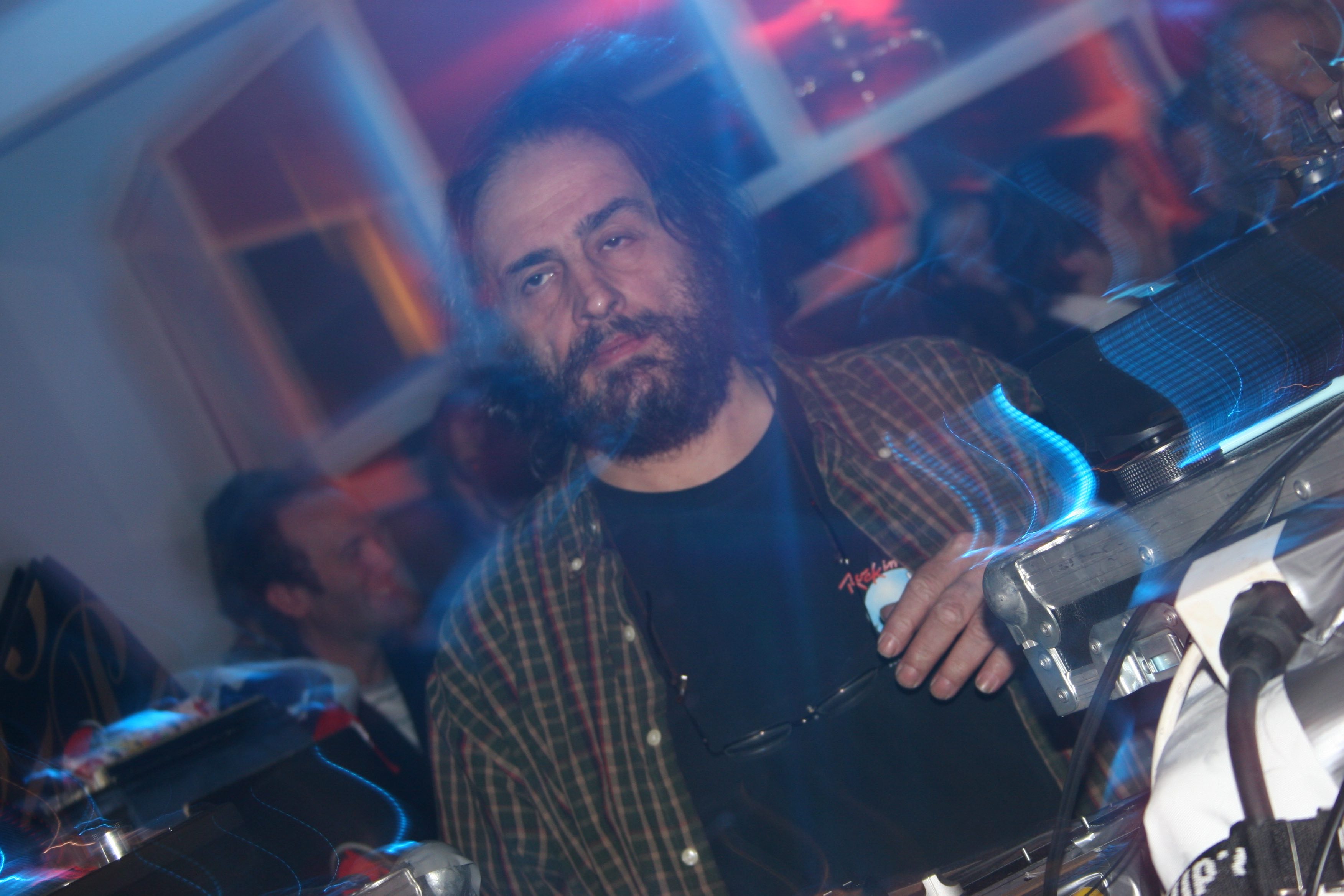In 2003 ”Prins” Thomas Moen Hermansen asked his brother Espen “Haa” Moen Hermansen. “Wouldn’t it be cool if we got David Mancsso to Oslo.” Driven by a passion and interest for David Mancuso’s work and philosophy, Espen took on the mammoth task, not just once, but twice and through those encounters and a few more that centered around trips to the Loft parties in London, Espen got to know the DJ and Disco legend a little better than most.
Espen Haa had been DJing since the early nineties, and alongside his older brother, he has played an instrumental role in the Full-Pupp events that ran for 15 years at Blå. A dedicated selector, record collector and clubbing enthusiast, Espen has also played a fundamental part in facilitating the scene in Oslo, and has recently took it up himself to re-issue some rare and forgotten gems on the 12” format courtesy of his Neppå label.
He’s hosted, promoted and DJ’d a fair few events throughout his career in Oslo, but some of the most significant of these are two that brought over David Mancuso.
The allotted space of this introduction here would not even begin to scratch the surface of the legacy of David Mancuso on the modern DJ scene today.Books have been written about the man and his monumental influence on club and DJ culture. Disco exists because of David Mancuso. The music that he played and presented at his legendary Loft parties in New York would fuse into Disco ten years later while the philosophy of his parties would inform what eventually become Paradise Garage, the Gallery, Studio 54 and every club in existence today, and that’s no exaggeration.
His emphasis on sound and the unwavering philosophy of social engagement he brought to his events are some things that still echo through our scene today. Yet, nobody embodies this spirit more than David Mancuso and when he passed away in 2016, he left a profound legacy that no other DJ, promotor or club has, or will ever be able to amount to.
A reserved person, especially in the years leading up to his death, David Mancuso has very rarely been interviewed, and has had few acquaintances that knew him all that well outside of his inner sanctum of his New York clique. While I’ve read a lot about David Mancuso, I’ve never really spoken to anybody that has had more than a passing word with him.
Espen however, through his dealings with Mancuso in Oslo and his own interests in the Loft and the philosophy, has gotten to know the man on a personal basis throughout the years and I reached out to Espen to find out more about their relationship and fill in some blanks for us.
How did you first find out about the Loft and David Mancuso?
I think it was around the late 90s, we talked a lot about New York and its influences and in the early 2000’s me and my friend and DJ, Marius Jøntvedt (DJ Muriazz) went to New York on a pilgrimage to seek it out. We had heard about the Loft and Mancuso, but we went to Body and Soul, because it was like the closest version of the (defunct) Loft at that time. It was very fascinating and inspiring.
Was he playing at those body and soul parties?
No, but the link between the Loft and Body and Soul was there, because they tried to party in the spirit of Mancuso with downtempo and uptempo; going back to back; no alcohol license; and going from the afternoon into evening. It was very different from nightclubs and very much a private thing.
What inspired you and Marius to go over and experience it all for yourself?
We were into the whole US House, Garage and Disco thing, and it was very natural to go over there and visit all these great record stores. We went to a house party with Danny Krivit in Brooklyn and we were the only tourists there. We made it to to all these great spots. We tried to go to all these places where most of all this music is from. We went record shopping and partying for two weeks.
It wouldn’t have been as popular as today or even the early nineties at this point.
It’s hard to say, but there were a bunch of record stores still in New York and we were going to parties on a Monday and Tuesday. I don’t think it is like that anymore. It might not have been a peak for House music, but Ron Trent, Danny Krivit and Francois Kavorkian all still had residencies there.
 Tell me about going to the Loft.
Tell me about going to the Loft.
I was never at the Loft in New York, I was at the Loft parties in London. I don’t think David was doing any parties in New York at that time. There was a period between the mid-eighties to the late nineties that he was not really that popular. He moved the club in the mid-eighties and lost a lot of his audience. In the late nineties he started to get to know an English guy called Tim Lawrence, who wrote the book “love saves the day.“ He actually got David back doing parties in the early 2000’s in London.
So you never met David in New York?
I actually met him in Oslo for the first time and then I met him a few times after that again in London.
The Loft was such a significant space because of David’s philosophy behind it. How did it translate to a party in London?
At least they tried to create the same kind of vibe. David was always like: “if you have to do a party that’s not in your own apartment, you have to ask yourself, could I stay here at night.”
The parties in London were on the second floor of a pub in a big space. It was a rented space and it wasn’t anybody’s home, but it was a super-friendly vibe. It’s possible to transfer the same vibe if the people that are there are at the party for the right reasons. It was a community.
I think he was happy with the space in London, because they had it for many years.
And David would play his records there?
David would play his records there. It started at five in the afternoon with super-mellow, spacey music and people would arrive like a normal house party and then it developed as the dance floor got going. It peaked for a few hours and then he took it down again. He played for roughly six hours.
He was always very adamant that there shouldn’t be any mixers in his setup and that a record should play all the way through. Did he at any point change that approach in London?
No. At every party I saw David, he never mixed. He didn’t even want to see a mixer. (laughs) It just interfered with the music for him. He was very particular about playing the whole record. He saw the music as a piece of art, and thought who am I to do anything about that. He was very straightforward about that and he still respected people that wanted this flow, mixing records together, but it wasn’t for him really. I discussed it with him several times.
Was he playing LPs or 12”?
He wanted to play music as good as it could be and he preferred the 12” for that reason. He could easily play a 14 minute side from start to end.
Was it generally older stuff he played, or did he throw some contemporary things in there?
At the first parties, he was very stuck in his own music and stuff he had been playing for thirty years. I actually tried to slip him some new stuff and he took in some modern House stuff, but peak time he gave people the classic stuff.
When he was playing to people that were dancing, was it usually beat-driven kind of stuff in the sense of that quintessential early Disco sound?
Well, when people were dancing he played beat-music. Early on he played more drizzling and exotic music, often beatless. He was a master in building up, and he could play “non-party music” for a couple of hours. He wanted that. Who wants banging music from the minute they arrive at a party?
When you did get him over to Oslo, I imagine it wasn’t easy?
No, it wasn’t easy. I had quite a few people warn me about it. “Espen you don’t need this in your life,” they said. It’s this whole package that you have to say yes to.
I did The Loft in Oslo With Marius Jøntvedt, Jan Erik Sondresen and Marius Engemoen (Marius Circus). The first time we had him over, it was actually at Blå where Thomas and Strangefruit had this night called Cosmic Jam sessions and Thomas asked me to try and get David Mancuso over. I emailed David, and he wrote back a few days later; “when can I call you?” He wanted all correspondence to be over the phone.
I convinced him it was a friendly place and it was a friendly environment, and we paid him quite well. We did it in combination with one of the Loft parties in London.
It was pretty interesting having a guy like him coming to guest a night at Blå, but because he didn’t really know the music, he was very clear on opening for Thomas and Pål. That was hard to sell to the audience, because people came roughly at 23:00 like they do in Norway.
 Did he just play on Blå’s soundsystem?
Did he just play on Blå’s soundsystem?
Well the first time he even played with a mixer. He didn’t do any knobbing, just brought the volume up and down and played the songs as he always has. The second time we did a lot more with the sound.
Tell me about the second time?
This was 2005. We decided to do the whole Loft thing, with the soundsystem, the food and everything. We rented Stratos because it was the highest room in Oslo, but we didn’t have any Klipschorns or any big home stereo rig so we rented a system from a place in Drammen.
David insisted on somebody to do the sound and I was like: “we’ll find somebody”. And David said, “no no, there’s two ways to do the sound Espen, the right way or the wrong way.” We had to get this guy called Ian Mackie from Scotland, he did all the Loft parties in London.
We had to have David here for a whole week, so he could get to know everything. We had to get a stereo installed in his hotel room so he could listen to records, crazy stuff. We did no promotion, because that’s the way they did it in New York. This wasn’t very smart, we should’ve advertised it a little more. It was a new thing to Oslo, this old-school private party, and the night went fine, but we lost a lot of money so we never did it again. (laughs)
After that I had to go to London if I wanted to see David.
You got to know him a little during this time. What was he like as a person, did that kind of pedantic thing he had about music extend to his personality as well?
We got to know him and I spent a lot of time with him. He was passionate and very idealistic, but he was shy as well. He was interested in music, but he was very political as well. He was always talking about progression, and getting the different sides of society to meet. He was very into the concept of breaking boundaries and getting people together and the parties were ideal for that. He was very concerned about the less-fortunate people in society.
He was an introvert and not easy to communicate with. It took some time to get under his skin, but after a few days and more meetings, the corners became a little more rounded. He was a bit withdrawn. This man had been worshipped for 35 years and he was used to being in the middle of things, so he was social, but not very outspoken.
We talked about music and equipment and the madness of nightclubs taking too much money on alcohol. He had stopped taking drugs and I believe he took a lot of drugs in the eighties. He barely drank while he was over here. He wasn’t very interested in having a lot of people around him but on a one-on-one situation he was an incredibly interesting man to talk to.
You say he didn’t drink much, but I always thought he was completely against drinking and the Loft didn’t allow any alcohol?
I think he had a bottle of whisky with him in the booth. (laughs) I know at the Loft parties in New York, people brought their own coolers with drinks. They didn’t have a cabaret license because David wanted to make this a party thing, he didn’t want to make any money from the bar.
I know he did make a lot of money in admission in the late seventies and early eighties. These are things I’ve learnt from Tim Lawrence: he earned a lot of money and he spent it all on Hi-Fi and his friends. He was super generous with his friends.
 Did you ever talk to him about the peak era of the Loft?
Did you ever talk to him about the peak era of the Loft?
A little bit, but he wasn’t really into sharing and we asked a lot of questions. He was kind of general about it. He talked about Paradise Garage and studio 54 as places quite different from the Loft, because they had a focus on celebrity and Disco.
The early Loft space was like 150-200 people and it was quite small and private. He wasn’t into the name game at all. I don’t think he even think he liked the subject.
He wanted to speak about the cause and all the things that happened in New York in the seventies and the eighties with all the gay people and the poor people being pushed out of Manhattan. These were topics for David.
He didn’t want to refer to the Loft as a Disco. He played Funk, Jazz, Latin and Afro and the Disco came in in ‘75. The fusion of everything he played became Disco in the mid 70s.
When was the last time you saw him or had a conversation with him?
That could be 2008 in London. I don’t remember when, but at some point his health deteriorated and he wasn’t travelling. Colleen Cosmo took over as the musical host in London. It was always a highlight to come to London and see him and speak to him.
It was a brief friendship, and I didn’t know him very well, but I spent some time with him. I emailed him a lot, but around 2010, he just stopped answering emails and I know he did that with a lot of people. The last 6 years of his life he had only had a handful of people around him that he trusted, but it wasn’t much more than that.
And looking back on it all, was there a piece of music that defined the David Mancuso’s sound for you through all your endeavours together?
It’s hard to pick one track, I have to name three:
Demis Roussos – L.O.V.E Got a hold of me
Brass Construction – Music makes you feel like dancing
Roy Ayers – Running away
And he never played bootlegs. Sound quality was one thing. And he thought it was unheard of to support releases that did nothing for those who wrote the music.

